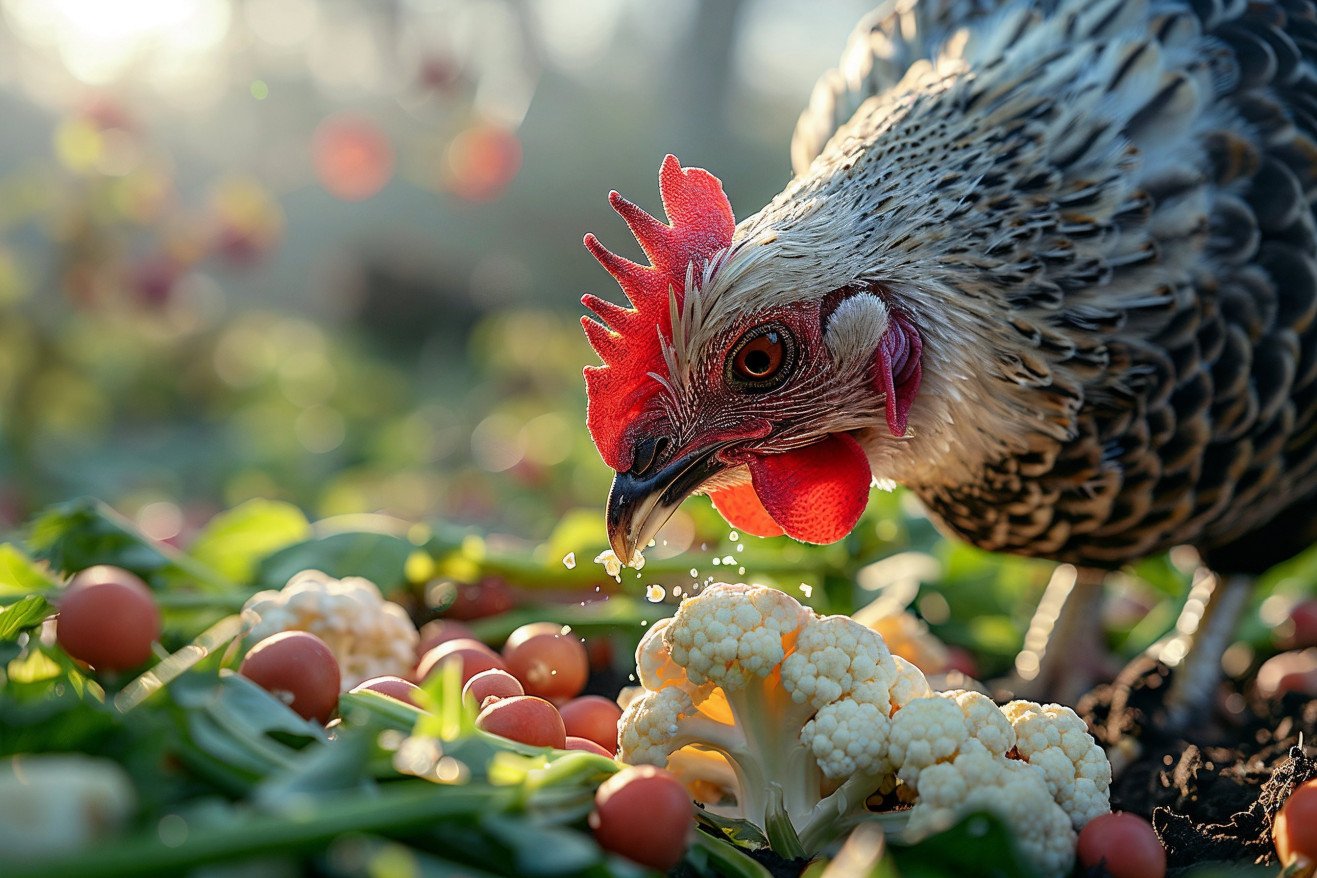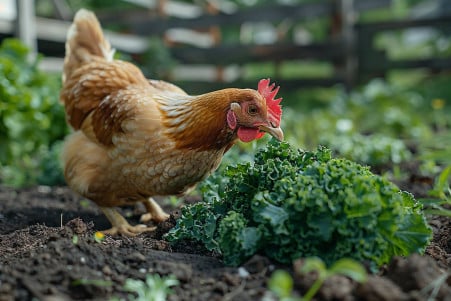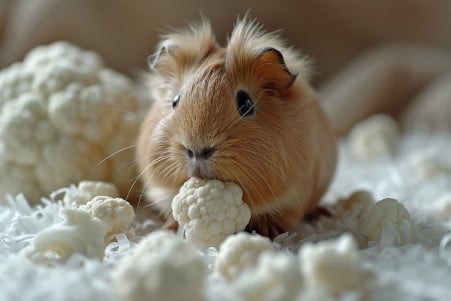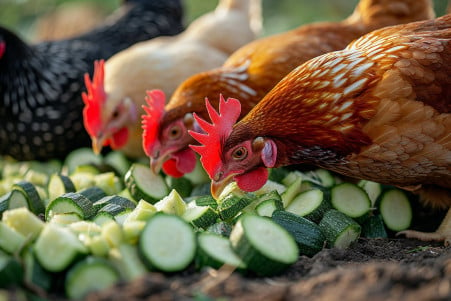Can Chickens Eat Cauliflower? Nutritional Guide for Your Flock
19 February 2024 • Updated 18 February 2024

Cauliflower is a staple on our dinner tables, but is it a good choice for your backyard chickens? The answer is yes, chickens can eat cauliflower. Not only is it safe, but it’s also a nutritious option that’s high in calcium and vitamins B6, C, and K.
Make sure to feed it to your chickens in moderation, following the 90/10 rule—90% chicken feed and 10% treats—and make sure to include all parts of the vegetable, whether it’s cooked or raw.
This article will take a deep dive into the many layers of avian nutrition, with a specific focus on what chickens need and how cauliflower can help meet those needs. By reviewing agricultural research, expert advice from poultry nutritionists, and in-depth articles from chicken hobbyists, we hope to give you a comprehensive look at how to add cauliflower to your flock’s diet.
You’ll learn about the effects of cauliflower on chicken nutrition, the best ways to serve it, and the importance of a well-rounded diet.
Can chickens eat cauliflower?
Meeting Basic Needs: Foraging and Chickens’ Natural Diet
Chickens are omnivores with a natural instinct to forage for a diverse range of foods. In the wild or on a free-range farm, chickens eat a diet that includes seeds, insects, and green plants, all of which are important for their overall health and well-being.
Foraging is an important part of chickens’ daily routines, enabling them to satisfy their dietary requirements through a biologically hardwired behavior.
One study published in PMC found that foraging behavior, which is defined as pecking and scratching at the ground, is consistent within individual chickens and can be used to predict their use of the range, which in turn impacts their diet and welfare.
Foraging behavior and, by extension, dietary intake are also heavily impacted by the environment. One study published in Animals found that flooring treatments impacted the behavior and activity of broiler chickens.
Chickens were more likely to engage in natural behaviors, including foraging, when they had access to clean litter, which is a positive sign of their welfare. As a result, the type of flooring and the cleanliness of the environment are important factors in encouraging natural dietary behaviors.
When it comes to whether or not to feed chickens cauliflower, it’s important to consider whether or not it encourages their natural foraging behaviors and if it can be offered in a way that supports the environmental conditions that encourage their natural dietary preferences.
The Healthy Snack: How Cauliflower Impacts Chicken Nutrition
Cauliflower, which is now known to be a healthy snack for chickens, is packed with vitamins and minerals that can help chickens in a number of ways. According to BackYard Chickens, cauliflower is high in calcium, which is important for healthy bone growth and strong eggshells.
The iron in cauliflower helps chickens maintain healthy blood and avoid anemia in laying hens. It’s also high in phosphorus, which is important for bone health and egg production.
Some of the vitamins in cauliflower that are important for chickens include vitamin C, which helps the immune system; vitamin K, which helps with blood clotting and wound healing; and vitamin B6, which is important for protein metabolism. The Happy Chicken Coop also lists other important nutrients, including vitamin E, which helps the immune system and egg production; vitamin B1, which helps with carbohydrate metabolism; and fiber, which aids in digestion.
Despite the many nutrients that can be found in cauliflower, it should be used as a supplement to a chicken’s regular diet, not as a replacement for it. While the nutrients in cauliflower can help with different aspects of chicken nutrition, they can’t provide the complete nutrition that a balanced, commercial diet can.
However, by adding cauliflower to a chicken’s diet, owners can help ensure that their chickens are getting the best nutrition possible without relying too heavily on any one food source.
Watch Out for Cauliflower: How to Keep Tabs on Your Chickens
Although cauliflower can be a healthy addition to your chickens’ diet, there are some potential pitfalls and warning signs to keep an eye out for. A report by Chickens Corner notes that some of the compounds in cauliflower and other cruciferous vegetables can cause gassiness and digestive issues in chickens. To avoid this, introduce cauliflower slowly and keep an eye out for any digestive issues in your chickens.
One of the most important things to keep in mind is portion control. Levidia suggests starting with a small amount, like a handful of cauliflower florets per chicken. If your chickens seem to tolerate it well, you can increase the amount, but make sure you don’t give them too much, especially since cauliflower is high in water and can cause loose droppings if they eat too much.
It’s also best to give cauliflower to your chickens raw rather than cooked to make sure they get the most nutrients and to avoid the risk of choking. SoCal Nestbox notes that chickens have sensitive digestive systems and that it’s important to keep a close eye on them when you make any changes to their diet.
Keep a close eye on your chickens and make sure to adjust their diet as necessary to make sure that cauliflower continues to be a healthy treat and not a source of distress.
How to Safely Feed Cauliflower to Your Chickens
To ensure that your chickens can safely enjoy cauliflower, there are a few things to keep in mind in terms of preparation and portion size. FirstLightFarmer suggests feeding cauliflower raw to your chickens to ensure that they get the most nutrients, including calcium, folic acid, and other vitamins. To make sure that the cauliflower isn’t a choking hazard, cut it into small pieces.
Meanwhile, the CS-TF resource says that one floret of cauliflower is a good serving size for two chickens, which will help you make sure that you’re not overfeeding them and potentially causing them digestive issues.
To encourage your chickens’ natural foraging instincts, you can hang the cauliflower from a string in the coop or use a treat dispenser to make feeding time more stimulating and fun. This way, the chickens can peck at the cauliflower and play with it, which is similar to the scratching and pecking that chickens do in the wild.
You should also take your chickens’ ages and breeds into account. Younger chickens and smaller breeds will need smaller pieces of cauliflower than older chickens and larger breeds.
Kids That Dig notes that a mix of different foods, including leafy greens and vegetables like cauliflower, will help ensure that your chickens have a well-rounded diet. By being mindful about how you introduce cauliflower to your chickens, you can make sure that they get the most out of this dietary supplement.
Balance: Where Cauliflower Fits into a Chicken’s Diet
Balanced nutrition is essential for the health and well-being of chickens. The UGA Cooperative Extension describes a well-rounded approach to poultry nutrition that includes feeding chickens a combination of essential amino acids, carbohydrates, fats, vitamins, and minerals. As a supplemental food, cauliflower can be part of this equation by providing chickens with vitamins and minerals that may not be found in high enough quantities in commercial feed.
The Merck Veterinary Manual explains that chickens require a balanced diet that provides the nutrients they need to support their high level of production. By providing macrominerals such as calcium, which is important for bone health and the strength of eggshells, and a variety of B vitamins, which are important for metabolic functions, cauliflower can help support this balance.
However, it’s important to remember that cauliflower is just one part of a balanced, varied diet that also includes grains to provide energy and proteins to support growth and repair.
It’s important to make sure that chickens are eating a varied diet. By feeding them a mix of vegetables, grains, and protein sources, you can make sure that they get all the nutrients they need to stay healthy. Knowing where cauliflower fits into this equation can help chicken owners make the best choices for their birds’ nutrition and well-being.
In Summary: Where Does Cauliflower Fit in the Pecking Order?
Cauliflower is a safe, healthy snack for chickens that is full of vitamins and minerals that can help support their overall health. Whether you’re feeding them the white florets or the green leaves, it can be a positive addition to your chickens’ diet when given in the right way and in the right amounts.
Cauliflower can help support bone health and the immune system due to its high vitamin and mineral content. That said, it’s important to make sure you’re feeding it to them responsibly, especially since it can cause digestive issues and you want to make sure you’re sticking to the 90/10 diet rule for the best health.
It’s important to make sure you’re watching your chickens after they’ve eaten cauliflower to make sure they’re not having any issues with it. Feeding it to them raw will help ensure they’re getting the most nutrients from it and it will also help encourage natural foraging behavior, but it’s important to remember that it should be a supplement to their regular feed, not a replacement.
In summary, cauliflower can be a great addition to your chickens’ varied and balanced diet. By making sure you’re feeding it to them responsibly, you can feel good about adding variety to their diet and helping them be as healthy and happy as possible.


